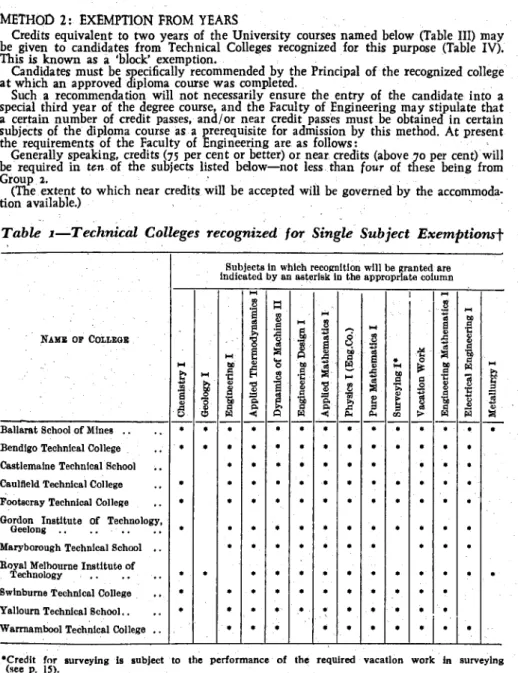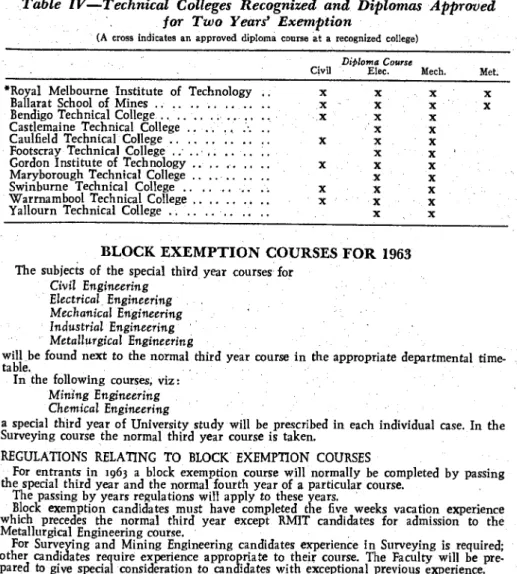All students admitted to the first year of engineering in 1963 may be required to have their photograph taken for record purposes. The lists may subsequently be changed on the recommendation of the Board of Technical Schools.

Civil Engineering
The following rules apply to practical work in all subjects of the courses in the Faculty of Engineering. Branches of the bank will be found next to the Book Room and in Union House.

GRADUATION
STUDENT COUNSELLORS
APPOINTMENTS BOARD
STUDENT FACILITIES
The course topics for each of these degrees and the years they relate to are determined by the professors' board on recommendation from the faculty. A candidate who has passed or obtained credit for each year of the course, and completed the work prescribed under section 3, may be admitted to the appropriate degree.
AGRICULTURAL ENGINEERING
UNITØ 1, 2
- Ø.151 Earth Science
Until 1947, Electrical Engineering was taught within one Engineering department by Associate Professor E. The program was primarily aimed at the traditional heavy-current Power subjects. Machines Part II 559 Physics Part II (Engineering Training) 557 Applied Mathematics Part II 562 Material Strength Part IIA 596 Electrical Engineering Part I THIRD YEAR.
1 12-1 Industrial Management
645 Applied thermodynamics part II 65o Dynamics of machines part III 584 Engineering design part II (Mechanical) 585 Engineering mathematics part III. 667 Strength of materials part III 566 Engineering mathematics part IIIA 65o Dynamics of machines part III 645 Applied thermodynamics part II 591 Properties of metals.
12-1 Engineering
In 1882, studies in metallurgy related to mining were introduced as part of an option in the fourth year of the newly created degree in Civil Engineering. The staff in the Metallurgy Department consists of twelve full-time teachers and eight full-time research staff. The department's teaching and research activities are classified under two main headings: Materials Science and Materials Processing.
The chemical or extractive metallurgy section of the Metallurgy department's work includes both the physical chemistry of the processes and the chemical engineering aspects of the commercial production of metals. During the third and fourth year, the emphasis shifts to the application of scientific principles and examination of the main technological features of materials and their processing. The Department of Metallurgy also offers core subjects in Metallurgy courses run under the auspices of the Faculty of Science and Applied Sciences.
It also has a significant reputation in connection with the professional requirements for membership of The Institutiop of Metallurgists, London.
PART-TIME TEACHING OFFICERS Lecturers
THIRD YEAR
All students registering for any course in Physics Part II must complete a Practice Card when registered in the Ofl%e Student Papers, whether the course involves practical work or not. The small number of students enrolling in these subjects can only be due to a lack of recognition of the excellent opportunities for graduates in the fields of mining, mineral processing and metallurgy. At the University of Melbourne in 1874-5 an option was introduced in the third year of the course leading to the Civil Engineer certificate, which allowed students to specialize in civil engineering or mining.
When the study of civil engineering was introduced in 1882, a similar option was maintained in the fourth year. In the mining subject, the first two years lay the foundations of chemistry, physics, mathematics, geology and general engineering subjects, including geodesy. In the Mineral Engineering subject, the emphasis is on the processing of all types of mineral raw materials using various physico-chemical processes.
The first two years lay a foundation of physics, chemistry, mathematics, geology, general engineering and materials science, and are almost identical to the first two years of the Metallurgical Engineering degree.
SURVEYING
5.15-6.15 Town Planning
IN ENGINEERING MANAGEMENT 1. A person may be a candidate for the Diploma in Engineering Management if—
A course of one lecture per week throughout the year, together with some seminar discussions, and mainly related to the problems of the individual farm firm. A course of three lectures and three hours of practice per week, in the Fourth Year, in the general subject of Farm Power and Machinery. A course of three lectures and three hours of practice per week in the fourth year, on the subject of Farm Buildings and Structures.
A course of three lectures and three hours of practice per week in the fourth year on the general subject of Hydrology and Water Engineering. A course of four hours of instruction per week throughout the third year, including practice classes and demonstrations. A course of one lecture per week and two hours of practical work per week throughout the year.
A course of approximately eight lectures per week, with laboratory and drawing work throughout the year.
COMPULSORY (a) Fluid and Particle Mechanics
EXTREME CONDITIONS • (a) Low Pressure
GROUP 4. PROCESS CHEMISTRY (a) Electrochemical Processes
GROUP 1
Students are expected to attend all courses in Group I, and choose, together with the Head of. Condensing turbines, bypass turbines and back pressure turbines and the economics of their application in steam and power distribution in industrial processes. In all four cases, methods of achieving the extreme state, materials for maintaining the extreme state, and ways of measuring the extreme state will be considered, together with the effects of the state on transfer processes, kinetics, and equilibria.
Process Chemistry
The exams will take place during the year at the end of the optional units. The results of the practical work during the year will be evaluated in the context of the exam. Three hours a week of drawing office work and some lectures in the first semester.
The results of the practical work done during the year will be evaluated as part of the exam. A course of two lectures and two tutorials per week for the first half of the year. Business administration - the study of cost factors, sources of capital, and other issues related to industrial activity that concern the practicing engineer.
A course of two lectures per week in the first part of the year (approximately зо lectures in total), together with practical and self-study work.
Further questions on more advanced aspects of the course will be set in one of two combined final honors papers in the.
One 3 hour written paper, one practical test of 3 hours, ao minutes
Some additional questions on more advanced aspects of the course, together with questions from other subjects, will be asked in one of two combined final honors papers. Some follow-up questions on more advanced aspects of the course will be asked together with questions from other subjects in one of two combined final honors papers. Nine hours a week in the first half of the year for experiments and exercises related to the fourth year subject.
During the first half of the year, nine hours a week of experiments and practical lessons that tie in with the subject matter of the electives in the fourth year. All work done in connection with practical work and practical lessons is taken into account in the assessment of the results of the year's work in conjunction with the results of the annual examination. The assessment of the results of the annual work takes into account all the work done in connection with the practical work and practical lessons, together with the results of the annual examination.
All work done in connection with practical work, practice lessons and field trips is taken into account in the assessment of the results of the year's work in conjunction with the results of the annual examination.
607. METALLURGY PARТ I
Tests throughout the year and two 3-hour papers for Pass and Honours; a one-day practical examination may be taken. All work done in connection with practical and training classes and excursions will be taken into account in assessing the results of the year's work in conjunction with the results of the Annual Examination. All records made during the year must be retained for submission if necessary in connection with the Annual Examination.
608. METALLURGY PART II (E)
All work done in connection with practical and tutorial classes, and excursions will be taken into account in assessing the results of the year's work in conjunction with the results of the Annual Examination. Practical work done during the course will be assessed as part of the annual examination. Practical work done during the course will be assessed as part of the Annual Examination.
The course consists of two hours of lectures and two hours of practical work per week throughout most of the year. The full fee is withheld as we will not charge for reasonable wear and tear of the appliance. and Halliday, D., Physics for Science and Engineering Students, I and II. part. ind., Addison-Wesley.). Interpretation of binary alloy structures; relationship between structure and properties;. changing properties by heat treatment.
All work done in connection with practical work and practice lessons is taken into account in the assessment of the results of the year's work in conjunction with the results of the annual examination.
561. STATISTICS FOR ENGINEERS
463. STATISTICAL TECHNIQUES
666. STRENGTH OF MATERIALS PART II
CHAPTER 5
This degree may be obtained upon completion of not less than one year of advanced studies and research in the engineering and/or metallurgical laboratories of the University upon completion of Bachelor of Engineering degree training. All fees are to be paid into the university's account at a branch of the National Bank of Australasia. Applicants for the Master of Engineering degree shall, upon completion of the Bachelor of Engineering degree course, undertake advanced studies and research at the engineering and/or metallurgical laboratories of the University for not less than one year and must then present a dissertation based on original work in a branch of engineering approved by the faculty.
The faculty will not admit any person as a candidate for the degree unless in the opinion of the faculty he has already made substantial published contributions to Engineering. Depending on the statutes and regulations of the University, the faculty gives instructions for conducting the exam. The candidate must also satisfy the examiners in such written, oral or practical examinations as may be required by the Board on the recommendation of the examiners.
The Registrar deposits in the library of the university a copy of the thesis or work submitted by each candidate who has satisfied the examiners.
CHAPTER 7
In addition to the prices listed on p. 145, are available to Electrical Engineering students:. Field - Title and approximate value .. additional to the prices listed on p. 145, these are available to students.